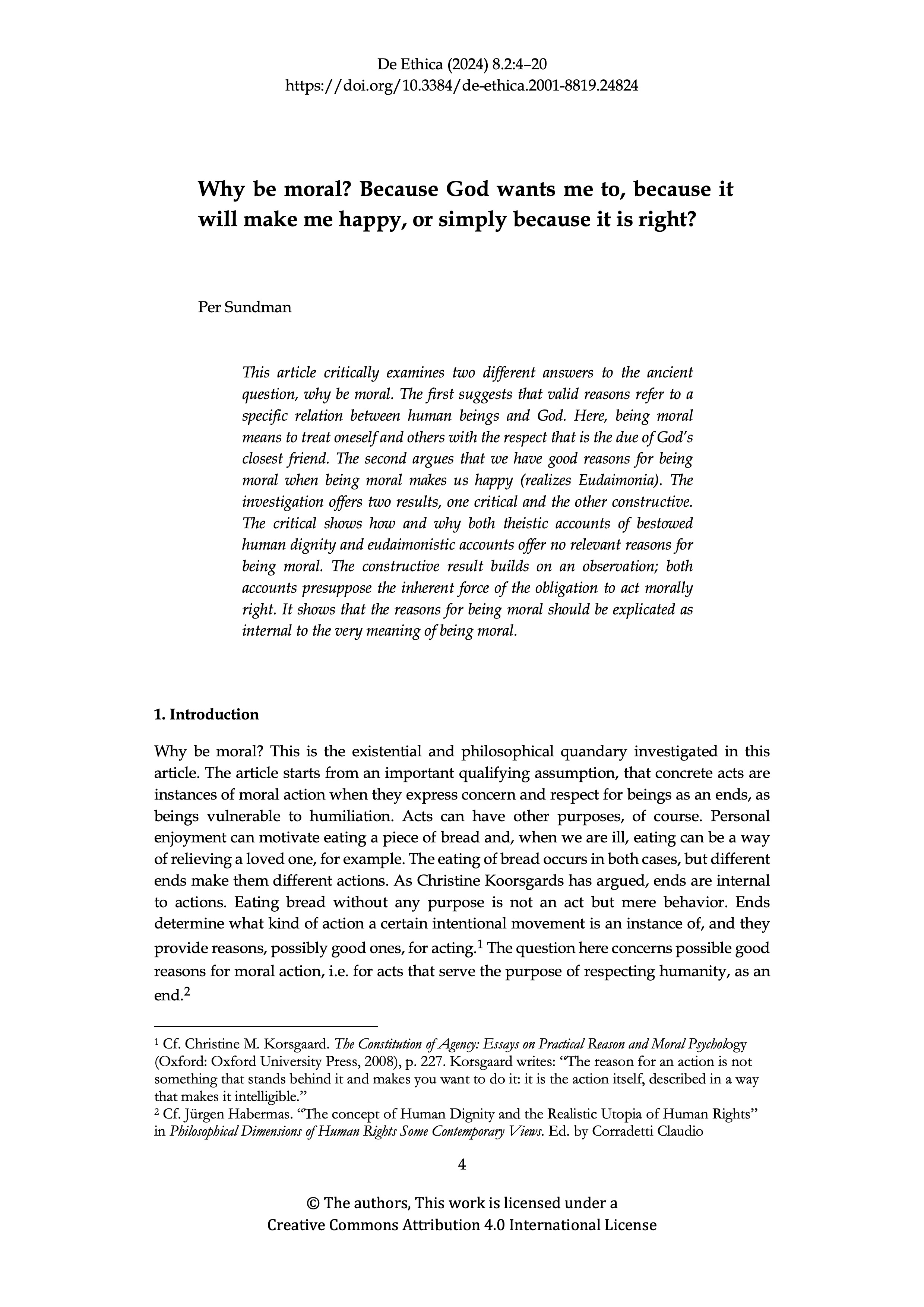Why be moral?
Because God wants me to, because it will make me happy, or simply because it is right?
DOI:
https://doi.org/10.3384/de-ethica.2001-8819.24824Keywords:
Human dignity, Eudaimonia, Bestowed worth, Basic equality, Why be moral?Abstract
This article critically examines two different answers to the ancient question, why be moral. The first suggests that valid reasons refer to a specific relation between human beings and God. Here, being moral means to treat oneself and others with the respect that is the due of God’s closest friend. The second argues that we have good reasons for being moral when being moral makes us happy (realizes Eudaimonia). The investigation offers two results, one critical and the other constructive. The critical shows how and why both theistic accounts of bestowed human dignity and eudaimonistic accounts offer no relevant reasons for being moral. The constructive result builds on an observation; both accounts presuppose the inherent force of the obligation to act morally right. It shows that the reasons for being moral should be explicated as internal to the very meaning of being moral.
References
Audi, Robert. Moral Knowledge and Ethical Character, Oxford: Oxford University Press, 1997.
Bernstein, Richard J. ´Does He pull it off? A Theistic Grounding of Natural Inherent Human Rights?´. Journal of Religious Ethics, 37.2 (2009), pp. 221-241.
Biggar, Nigel. Behaving in Public How to do Christian Ethics, Grand Rapids, Michigan: William B. Eerdmans Publishing Company, 2011.
Drucker, Malka. ´Introduction´ in Rescuers Portraits of Moral Courage in the Holocaust, edited by Block Gay and Drucker Malka, New York: Holmes & Meier Publishers, 1992.
Gustafson, James M. Ethics from a Theocentric Perspective, Volume One, Theology and Ethics, Chicago: Chicago University Press, 1983.
Frankfurt, Harry G. The Reasons of Love, Princeton: Princeton University Press, 2004.
Glover, Jonathan. Humanity a Moral History of the Twentieth Century, London: Pimlico, 2001.
Habermas, Jürgen. ´The Concept of Human Dignity and the Realistic Utopia of Human Rights` in Philosophical Dimensions of Human Rights Some Contemporary Views, edited by Corradetti Claudio, Dordrecht: Springer, 2012, pp. 63-79.
Hare, John E. God´s Command, Oxford: Oxford University Press, 2015.
Herdt, Jennifer A. ´Excellence-Prior Eudaimonism`. Journal of Religious Ethics, 47.1, (2019), pp. 68-93.
Hursthouse, Rosalind. On Virtue Ethics, Oxford: Oxford University Press, 1999.
Kant, Immanuel. Critique of Practical Reason, New York: Macmillan Publishing Company, 1956 (1788).
Kant, Immanuel. The Metaphysics of Morals, Cambridge: Cambridge University Press, 1993 (1797).
Korsgaard, Christine M. The Continuation of Agency Essays on Practical Reason and Moral Psychology, Oxford: Oxford University Press, 2008.
Marx, Karl. ´The German Ideology: Part 1` in The Marx Engels Reader Second Edition, edited by Tucker Robert C., New York: W. W. Norton & Company, 1978 (1923).
Morriss, Peter. Power A Philosophical analysis, Manchester: Manchester University Press, 1987.
Nozick, Robert. Anarchy, State, and Utopia, Oxford: Basil Blackwell Publishers, 1988 (1974).
Nussbaum, Martha C. Women and Human Development The Capabilities Approach, Cambridge: Cambridge University Press, 2001.
Outka, Gene. Agape A Philosophical Analysis, New Haven: Yale University Press, 1972.
Porter, Jean. ´Eudaimonism and Christian Ethics A Scriptural Perspective`. Journal of Religious Ethics, 47.1, 2019, pp. 23-42.
Rawls, John. A Theory of Justice, Oxford: Oxford University Press, 1989 (1971).
Ricoeur, Paul. Oneself as Another, Chicago: University of Chicago Press, 1992.
Singer, Peter. Practical Ethics Second Edition, Cambridge: Cambridge University Press, 1994.
Taylor, Charles. Human Agency and Language Philosophical Papers 1, Cambridge: Cambridge University Press, 1995.
Waldron, Jeremy. “Basic Equality” in New York University School of Law, Public Law & Legal Theory Research Paper Series Working Paper No. 08-61.
Wolterstorff, Nicholas. Justice Rights and Wrongs, Princeton: Princeton University Press, 2008.
Wolterstorff, Nicholas. ´Justice as Inherent Rights: A Response to my Commentators`. Journal of Religious Ethics, 37.2 (2009), pp. 261-279.
Wolterstorff, Nicholas. Justice in Love, Grand Rapids, Michigan: William B. Eerdmans Publishing Company, 2011.

Downloads
Published
How to Cite
Issue
Section
License
Copyright (c) 2024 Per Sundman

This work is licensed under a Creative Commons Attribution 4.0 International License.
